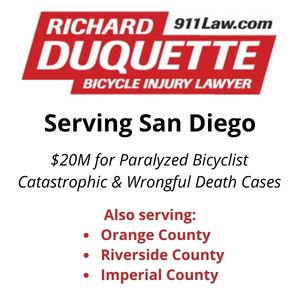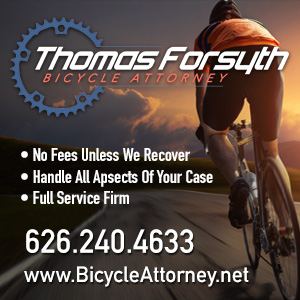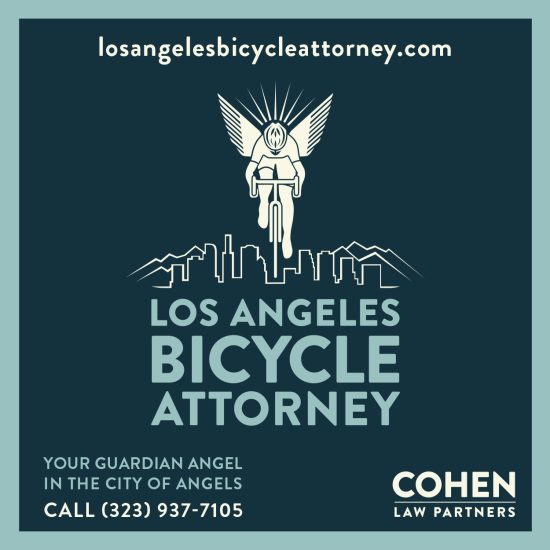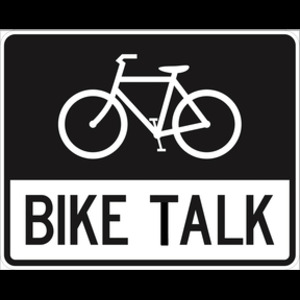
Don’t get me wrong. I like David Whiting.
The longtime columnist for the Orange County Register is one of us.
His heart is in the right place, showing time and again he cares deeply about the safety of people on bicycles.
But sometimes, not often, he’s just wrong.
And this is one of those times.
I wish he’d reached out to me before writing his latest column, calling for a mandatory bike helmet law for adults, as well as children.
We could have discussed why that’s a bad idea.
As well as clarifying that while this site is about advocacy, I’ve been the only one behind it since the Corgi died.
We might have started out with this observation.
Two girls, one about eight, the other about six, rip along in the middle of streets on motorized scooters that — and I am not making this up — zoom along at a solid 10 miles an hour.
Now, 10 mph may not seem like a lot if you’re tucked safely in a car. But hitting the asphalt at 10 miles an hour can destroy flesh, bone and skull, especially if a child is struck by a vehicle.
Yet that’s not what terrifies me.
What terrifies me is that these kids don’t wear helmets, an occurrence I see more and more.
I would have pointed out that, yes, anyone under 18 is required to wear a helmet on a scooter, just like on a bicycle.
There’s good reasoning for that. Children’s skulls and brains are still developing, and they lack the judgement to make an informed decision on whether or not to use a helmet.
But you’re also required to be at least 16 year old and have a driver’s license to rent a scooter, let alone ride it. So someone needs to have a good talk with their parents.
Then the conversation might have moseyed along to this study.
Rosenthal and Kreeger is a California law firm that specializes in injuries, but also does actual research that tilts toward actually saving lives.
“Since helmet laws have been instituted in the majority of states, at least for children the death rate for that age group has decreased,” the firm points out. “But research shows that over half of adult bicyclists still do not use a helmet at all.
However, there have been studies that suggest the reason bicycling death rates have declined for children is simply that fewer children are riding bikes these days, as parents ferry them to and from school and soccer practice. And everywhere else.
Some people blame helmet laws for that decrease, saying it makes bicycling seem dangerous.
I’m not sure I buy that argument; I think the reason is the just the dangers on our streets, real and imagined.
But that would have led to discussion of the mandatory, and much hated, bike helmet laws in Australia and New Zealand.
While those laws are similarly credited with a decrease in fatalities, they’re also blamed for a corresponding decrease in bicycling rates.
Which some argue makes the streets even more dangerous by reducing the safety in numbers effect.
And bike helmet laws lead to punitive enforcement, which convinces even more people that riding a bike is just not worth it.
And don’t get me started on how Seattle’s bike helmet law is blamed for killing that city’s first bikeshare program. Something they wisely addressed before taking another stab at it by allowing dockless bikeshare, which has been more successful.
But that’s another problem with bike helmet laws.
Using bikeshare is often a spur of the moment thing, and no one wants to cart around an awkward helmet all day on the off chance they might rent a bike or scooter.
That would lead us to this discussion.
Between 2010 and 2017 (the latest year available), the National Highway Traffic Safety Administration reports cycling fatalities increased by a whopping 35%.
In 2017, nearly 800 people were killed riding bicycles. Not surprisingly, there has been a corresponding increase in bicycle injuries — many of which are never reported.
I’ll add that California has one of the highest death rates in the nation, and Los Angeles and San Francisco made the top 10 list for the most deadly cities.
Yet there is no helmet law for adult cyclists.
Yes, the increase in bicycling fatalities is frightening, and has to be addressed.
But banning SUVs, with their deadly flat grills, and preventing cellphones from working in moving vehicles for anything other than directions and calling 911, would probably be more effective at reducing deaths than putting a bike helmet on every head on two wheels.
The problem with citing figures like that is that we have no way of knowing how many of the people who died were wearing helmets, or how many suffered head injuries.
We can project that from various studies, but at best we can only achieve a very rough estimation.
We also have no way of knowing if those people died as a result of head injuries, or if those injuries would have been survivable if they’d been wearing a bike helmet. Or if they suffered other injuries that would have cost them their lives anyway.
And that’s the last point I would have made.
Because bike helmets aren’t designed to protect against crashes with a car going 70 mph. Or 30, for that matter. And they don’t protect against injuries to any other part of the body.
Even the most expensive helmets are only required to withstand relatively minor impacts.
In other words, a fall off your bike, not a collision with a bus.
They also do nothing to protect against a traumatic brain injury, as I learned the hard way, unless you spring for the more expensive MIPS or WaveCel models.
And the jury is still out on those.
So yes, a bike helmet may help reduce the force of impact in a collision, as well as the severity of any head injury.
Or they may not, depending on the speed of the vehicle and angle of impact.
That’s if the straps don’t break and the helmet stays on. And if it’s still effective, and not degraded due to age or previous impacts.
A bike helmet is a single use device. Hit the pavement or bounce off a bumper just once, and it needs to be replaced.
That’s when I’d tell Whiting that I never ride without mine.
But I also recognize its limitations, and don’t count on a bike helmet to save my life. A helmet should always be seen as the last line of defense, after everything else — from street design to defensive riding skills — have failed.
There are also arguments that they actually increase the danger to riders, whether as the result of closer passes from drivers and riskier behavior by riders, or the dangers of rotational injuries.
Regardless of my own choices, however, I respect people who have made the decision not to wear a helmet, and I respect their right to choose.
Which is what adult bike helmet use should be.
A choice. Not a law.
So I would have ended by saying I respect you, David. I think you’ve done a lot of good for the bicycling community.
But next time, call me first.
Thanks to John McBrearty for the heads-up.
………
Sadly, Victor Bale forwards confirmation that a bike rider was killed in a Palm Springs hit-and-run Monday night. I’ll post a story later today.
Meanwhile, Consumer Reports responds to the increase in bicycling and pedestrian deaths by saying pedestrian detection systems should be standard on all cars. Even though they don’t really work all that well.
………
Say happy 50th birthday to Moab, Utah’s famed Slickrock Trail.
………
The war on cars may be a myth, but the war on bikes is all too real.
The recent assaults on Brit bike riders added yet another victim when a man suffered a broken collarbone after a passenger in a passing car pushed him off his bike.
………
Local
No news is good news, right?
State
Evidently, scooters pay. San Diego has received $1.5 million in licensing fees from micromobility companies in just the last six months.
Sad news from Fresno, where a bike rider was killed when he was run down by a stoned driver. Yet the CHP couldn’t resist blaming the victim for wearing dark colored clothing.
Danville cops reel in another thief with their locked bait bike. And they’re smart enough to use a bike worth more than $1,000 so it qualifies for felony theft.
A San Francisco letter writer says forget cars rolling stop signs, the real problem is people on bicycles. And apparently has a speed gun built into his glasses. Seriously, if you’re not going to stop, always obey the right-of-way, especially around pedestrians. And ride carefully around people on foot, who can be unpredictable, and are the only ones more vulnerable than we are.
San Francisco is slowly adding more red light cams to improve safety. Meanwhile, Los Angeles doesn’t have any, after removing them all to appease angry drivers.
National
The Bike League has a new boss.
A new bipartisan bill would take Vision Zero nationwide, providing cities with federal funds to design and implement Vision Zero programs, with a time limit of 20 years to eliminate traffic deaths.
Cycling Tips recommends ten bike books for the holidays. Whether you want to give one as a gift, or need something to get you through a visit with your relatives.
Believe it or not, you can actually get a “decent” ebike foldie on Amazon for less than $700.
A driving website recommends their picks for the best bike lights.
A veteran of the Afghan and Iraq wars is taking the long way across the US, riding 6,000 miles from DC to San Diego to call attention to PTSD.
Portland residents respond to a weekly’s recent call to stop driving and switch to ebikes. Some of which actually make sense, while others are exactly what you’d expect.
Police are dealing with an increase in thefts from Portland apartment and condo building bike rooms. You’re much better off keeping your bike in your unit, if possible; thieves love bike rooms because a) they’re usually empty of people at night, and b) full of bikes.
Kindhearted cops in a Washington town team with bighearted deputies to buy a little boy a new BMX bike after his was stolen.
Life is cheap on an Albuquerque Air Force base, where a truck driver got two and a half years for a) running a stop sign, while b) talking on his cellphone, and c) killing a man riding his bike.
A new documentary examines Minnesota moms who are ditching their cars for cargo bikes.
Bicycling catches up on the story of the Minnesota man who spent the last six years riding every street in his county. Meanwhile, another man did the same thing in central London.
The next time someone tries to tell you bike riders aren’t tough, tell them about the Detroit man who rode his bike to a gas station — after taking a shotgun blast to the face. He’s hospitalized in critical condition.
A Kentucky radio segment tells the story of a century bike race, from a previous century.
New York is responding to recent traffic deaths by retiming traffic lights to create a Green Wave, allowing riders to get a series of green lights to avoid having to stop; naturally, drivers are concerned that it might inconvenience them.
NYC installs its 100th mile of protected bike lanes under ex-presidential candidate and current Mayor Bill de Blasio. But Gothamist wants to know what’s holding up the long-promised bike lane on Queen’s Boulevard of Death. We could ask the same question about the entire LA bike plan.
Apparently having solved all the other crimes, Hoboken NJ hires a pair of officers to fight the scourge of scofflaw micromobility users.
Automotive sacrilege from a Streetsblog op-ed, which calls for New York to build protected bike lanes alongside bus-only lanes — even if it means a loss of parking.
International
More proof bike thieves just don’t care. It takes a real schmuck to steal the homemade ebike a Winnipeg high school student spent four years and thousands of dollars building from scratch.
A UK community is warned it won’t meet 2030 climate goals unless it cuts car ownership in half within the next ten years.
A writer for Cycling Tips takes his Tern to go carfree at Eurobike, the world’s biggest bike show.
When a Dutch rider can’t afford a mountain bike, he decides to shred an Austrian mountain on a BMX with no suspension and one “dodgy” brake.
A design website falls in love with the “timeless design” of a Swedish bike bikemaker, who believes the bicycle was perfected 100 years ago.
Heartbreaking story from Aukland, New Zealand, where an 18-year old champion track cyclist will never be the same after a driver ran a stop sign and slammed into his bike, leaving him with a major head brain injury and nearly costing his life.
Competitive Cycling
Merced makes its bid to host a stage of next year’s Amgen Tour of California, with a route that would pass Yosemite National Park and the birthplace of Ghirardelli Chocolates.
Outside says this is the golden age of American cycling, as long as you look past the men’s WorldTour.
A US Army sergeant picks herself up off the pavement after leading most of the day, and rallies for an 8th place finish in women’s road race of the Military World Games in China.
Finally…
Using your noodle to call for safer streets. Trump’s China tariffs mean more cars parked in the protected bike lane.
And as if LA drivers aren’t bad enough, now we have to deal with distracted rats behind the wheel.









